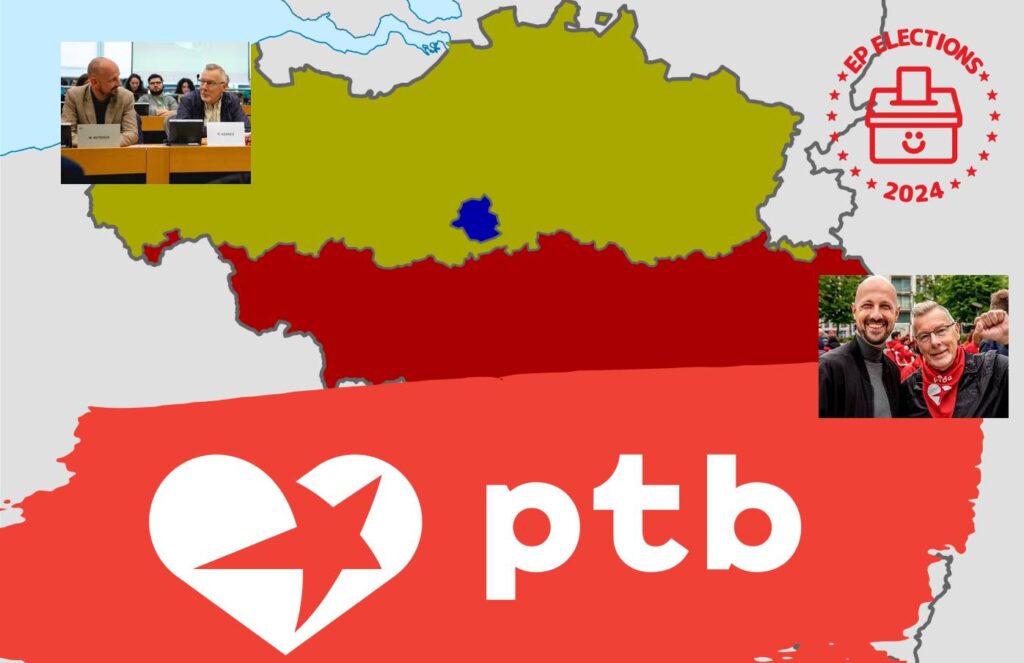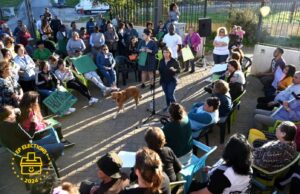In Belgium, the European elections took place in the shadow of parliamentary and regional elections. This is the reason why the results vary only lightly, with the political trends in Flanders and Wallonia showing in opposite directions.
Polling Error and Initial Results
Indeed, the moment of joy was short-lived for the supporters and members of the Workers’ Party of Belgium (PTB/PVDA) over the results of the post-election poll seeing the party in first position in Wallonia. In a moment of hurry, the researchers of the Free University of Brussels (ULB), headed by party specialist Pascal Delwit, had mixed up the columns of the Christian Democratic votes with the votes for the left party.

Source: Verian for the European Parliament
(https://results.elections.europa.eu/en/national-results/belgium/2024-2029/)
Regional Contrasts: Flanders and Wallonia
In Flanders, the right-wing extremist party Vlaams Belang (VB) (Flemish Interest) could increase their number of votes to 15.3%, but was unable to overtake the right-wing populist New Flemish Alliance (N-VA), which is heading the Flemish government and remains the largest party in the country with 18.4%. Together both parties have won 62, i.e. half, of the seats in the Flemish regional parliament so that VB could now form the government with the only party willing to enter a coalition with it, thus deepening the fragmentation of Belgium.
PTB’s Performance Across Belgium
The Workers‘ Party of Belgium (PTB/PVDA), the only party running in the entire country, came in fourth. It could increase its number of votes by 1.1% to 9.8% and its number of seats from 12 to 14. However, this result lagged behind expectations and polls. In Flanders, it increased its number of votes by 3% to 8.5%, which is more than a radically left party has ever been able to gain there. It also grew in the Brussels region, but, again, not as much as expected, from 12 to over 18%. Quite bitter for the PTB are its slight losses in its stronghold, Wallonia, where the party fell from 13.7% to 12.1%.
|
Results of the European Parliamentary Elections in Belgium |
|||||||
|---|---|---|---|---|---|---|---|
|
Party |
Political Group in the EU-Parliament |
Language Group |
Percentage of Votes in the Language Group |
+/- |
Share of Votes in Belgium |
Seats |
+/- |
|
MR |
RE (Liberals) |
French |
34.9 |
+15.6 |
12.4 |
3 |
+1 |
|
Open VLD |
RE (Liberals) |
Dutch |
9.1 |
-6.8 |
5.8 |
1 |
0 |
|
CDH/Engagés |
EPP |
French |
14.3 |
+5.4 |
5.1 |
1 |
0 |
|
cd&v |
EPP |
Dutch |
13.2 |
-1.3 |
8.5 |
2 |
0 |
|
CSP |
EVP |
German |
34.9 |
0.0 |
0.2 |
1 |
0 |
|
PS |
S&D |
French |
20.5 |
-6.2 |
7.3 |
2 |
0 |
|
sp.a/Vooruit |
S&D |
Dutch |
12.6 |
+2.4 |
8.1 |
2 |
0 |
|
Groen |
Greens/EFA |
Dutch |
10.0 |
-2.4 |
6.3 |
1 |
0 |
|
Ecolo |
Greens/EFA |
French |
10.1 |
-9.9 |
3.6 |
1 |
-1 |
|
PTB/PVDA |
The Left in the EP (ex-GUE/NGL) |
French |
15.4 |
+0.8 |
10.7 |
1 |
0 |
|
Dutch |
8.1 |
3.2 |
1 |
+1 |
|||
|
N-VA |
ECR |
Dutch |
22.1 |
-0.3 |
14.3 |
3 |
0 |
|
VB |
ID |
Dutch |
23.0 |
+3.9 |
14.9 |
3 |
0 |
Impact on European Parliament
At 10.7% in the European elections, the PTB did slightly better than in the elections for the House of Representatives. Marc Botenga, who has been heading the PTB in the European Parliament since 2019, will be joined by Fleming Rudi Kennes, a former member of the Opel workers’ council. Yet, the election result only has a minor impact on the European Parliament. While the Greens lost one seat, the Liberals and the Left gained one respectively.
Decline of Left-Wing Parties
Like in other European countries, both Green parties had to face significant losses. The Walloon Ecolo, which had been the strongest party in Brussels, was reduced by half. In Flanders, both Liberals (Open VLD), which provide the Belgian head of government, and Christian Democrats (CD&V) lost shares of their votes. Besides the VB and the PVDA, the Social Democratic-populist Vooruit is among the winners of the elections. In Wallonia, the clear winners of the elections are the Christian Democratic Les Engagés (+ 10%), which had already been on the rise in the most recent polls, as well as the Liberals (MR) governing in Brussels and gaining 8%. The Socialists ruling in Wallonia lost (3%) as did the regional party DéFI (- 1.5%). All in all, the left parties lost ten seats and now only hold 52 out of 150 seats.
Impact of “Cordon Sanitaire”
More often than once, the right-wing populists could be prevented in Wallonia and in Brussels from getting a foot in the door. In 2019, two right-wing lists failed. This time, the right-wing populist Chez-Nous (“At Our Place”) was running for the parliamentary elections at the state level and in elections for the regional parliament. Thanks to a functioning “cordon sanitaire,” a firewall of all parties and the media against right-wing extremists, the party, which was founded in 2021 with the blessing of Marine Le Pen from neighbouring France and of Tom Van Grieken, head of the Flemish VB, did not succeed in winning any seats. Regardless of their strong social media presence, the party remained below 3% and so was even behind its predecessor parties.
Voter Priorities Across Regions
The increase of the right-wing parties in Flanders and their failure in Wallonia has also got to do with the ranking by their voters of the issues regarded as the most pressing. According to a survey in April for the Belgian TV-station RTBF and the daily newspaper La Libre, the topic of “income/purchasing power” was number one among voters in Wallonia and Brussels, whereas in Flanders the topic of “immigration” was considered the most important. Although the importance of this topic was also growing in Brussels and Wallonia, it ranked only fourth in the list of urgent topics in Brussels and seventh in Wallonia. Moreover, grist to the mill for the right-wing extremists was the topic of “inner security”, which rose to third place in the list of important issues in Brussels after several shootings had shaken the capital. In all three regions, the topics of “health care”, followed by “pensions” and “taxation” ranked in the three prominent positions. The “climate” issue only held positions 7 to 10 in the ranking of crucial issues.
Internal Disputes and Electoral Results
Losses by PTB, PS and Ecolo in Wallonia in this election might well be explained by the fact that the PTB and the PS had been arguing for months about PTB’s participation in government, which led to a loss of trust among voters. This topic was on the agenda because, a year ago, PTB had been polling at 18 to 20%. Until now, it has made participation in the government dependent on a breach with previous neoliberal politics and on the government not complying with EU treaties conflicting with this. PS interpreted this as a pretext on behalf of PTB not to want to govern, which led to them directing a campaign against PTB for months, claiming that, unlike PS, it would refrain from taking responsibility and would, on principle, reject participation in government. When, however, PTB announced that, on the contrary, it was ready to enter a coalition and in the Walloon parliament even cooperated with Greens and PS to prevent a law which would have caused many students to give up their studies, the Socialists finally declared that a joint government with PTB was out of the question due to alleged programmatic differences. Yet, at least on paper, the political proposals of PTB, PS and Ecolo are not too different from each other.
Prospects for Left-Wing Governance
PTB’s five major preconditions for government participation on both federal and regional levels comprised the introduction of taxes for millionaires, return to the retirement age of 65, cutting politicians’ incomes by half, an end to the legal blockade of high wage agreements and tougher measures against big climate polluters. In Wallonia, the election results have rendered unnecessary any discussion regarding left participation in government, since MR became the party with the most votes and could form a government with Christian Democrats or PS. A left majority still exists solely in Brussels.
Cover image: PTB will send two MEPs to the next European Parliament: PTB’s returning MEP Marc Botenga (Wallonia) and PTB’s first-time MEP Rudi Kennes (Flanders). Image sources: Marc Botenga’s Twitter Account; PTB logo from PTB’s Facebook account; Map of Belgian Regions Flanders, Wallonia, Brussels by Vascer for Wikicommons (GNU Free Documentation License).



